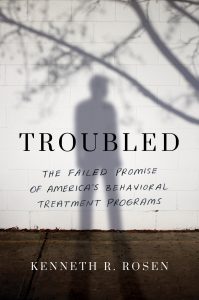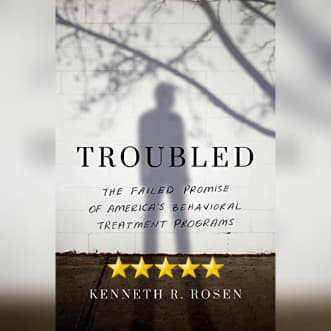 This week we’re looking at a troubling – yet anecdotal – tale that bears further research. This week we are looking at Troubled by Kenneth R Rosen.
This week we’re looking at a troubling – yet anecdotal – tale that bears further research. This week we are looking at Troubled by Kenneth R Rosen.
Here’s what I had to say about the book on Goodreads, and below that I’ll have a confession about a degree of a personal connection. 🙂
Tragic. Rosen uses case studies of four particular people and their experiences with wilderness re-education camps (and residential, boarding school style similar institutions) to paint a truly tragic picture. On an anecdotal basis, these camps seem horrifying in an Orange Is The New Black kind of way – an in depth look at the what really happens to some individuals. For what it is – these anecdotal experiences with a few claims backed up with the barest of bibliographies – it really is a strong read and a needed one. However, I would welcome a much more comprehensive, and cited, further examination along the lines of Radley Balko’s Rise of the Warrior Cop or Michelle Alexander’s The New Jim Crow. Because this particular topic, based on the strengths of these particular anecdotes, seems to warrant such an investigation. Very much recommended.
And here’s my personal connection to the book, such as it is:
Back during my personally-infamous “Year of Failure”, when virtually nothing was going right in my life, I actually worked at a Wilderness Education Camp for a month. In the middle of summer. In the mountains of North Georgia. (And, in my final week with that long-defunct company, the tidelands of the Big Bend area of Florida.) I thought, based on my own history, I might be able to make a difference in this type of environment, working with these types of kids. I quickly learned otherwise, but the overall experience – over 15 years ago now – was remarkably memorable in many ways, and indeed some of the lessons I learned there prodded me in directions that came to dominate at least some of my thinking for the past 15 years and, possibly, for the remainder of my life. So I personally look back on my own time in such a camp with a degree of fondness, and yet I can very much understand the tragedy of what these camps did to at least some kids. (To be perfectly clear, in my month there I never personally witnessed anything remotely like what Rosen describes in this book. One situation I personally witnessed involved a kid storming off on his own through the woods, and a counselor having to track him and try to talk him into rejoining the group. Another I learned about from the person it happened to after the fact was when a kid brought a copperhead into camp, proud to show it off. The counselor – who was originally telling me this story when I found him in the counselors’ cabin after having been to the Emergency Room over this – told the kid to bring the snake to him. The counselor got the snake from the kid, “calmly” walked over to a nearby cliff, and proceeded to try to toss the snake out of camp and off the cliff. Whereupon the snake wrapped down and bit him on the leg – resulting in the ER trip. But these are the only two incidents I remember of my time there that are even remotely similar to what Rosen describes.)

